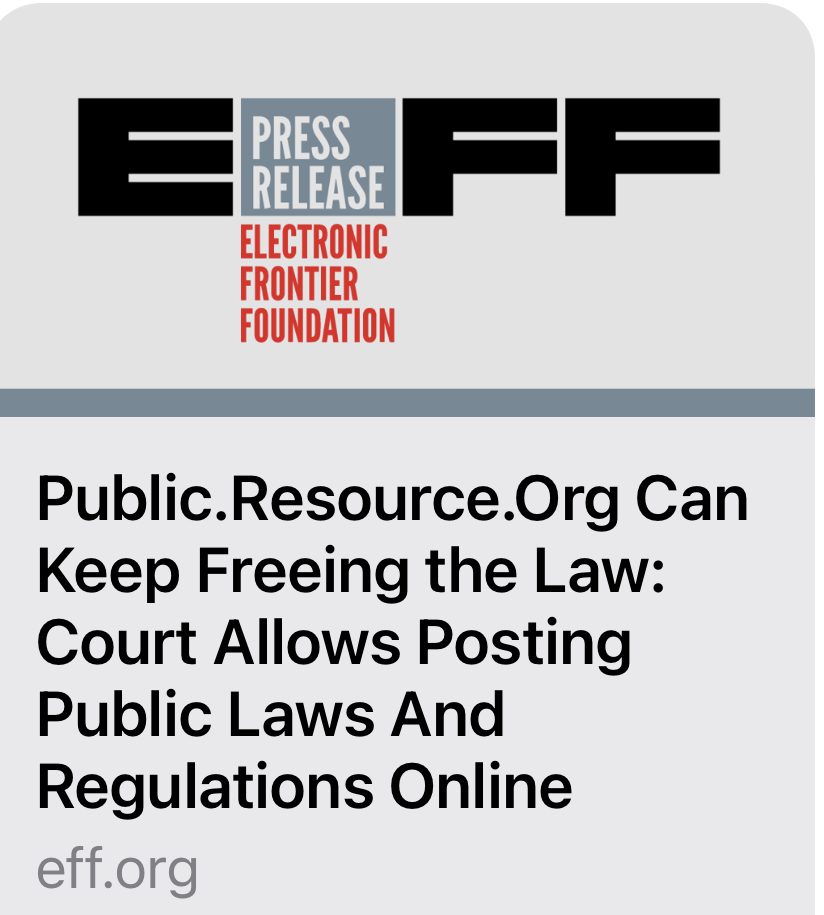
Having experienced a series of setbacks in attempting to obtain copies of Kentucky’s public laws from the Legislative Research Commission last year, Public.Resource.Org, Inc. founder Carl Malamud — no stranger to litigation — has again prevailed in the federal courts in a case involving the sharing of public laws, this time “technical standards incorporated into law.”
In August 2021, the Kentucky Open Government Coalition joined Public Resource and Malamud in requesting “copies of the Kentucky Administrative Regulations and the Kentucky Revised Statutes in the electronic source format in which it is maintained.”
https://law.resource.org/pub/us/foia/ky.gov.20210817.pdf
To no one’s great surprise, on August 27 LRC denied our request. We subsequently “appealed” to the Legislative Research Commission — the 16 member statutory committee that is made up of Senate and House majority and minority leadership that meets on an irregular schedule and that is charged under the revised KRS 7.119 with exclusive authority — no judicial review permitted — of reviewing appeals of the LRC director’s denial of legislative records requests.
https://law.resource.org/pub/us/foia/ky.gov.20210827.pdf
Ours was likely the first “appeal” of an LRC denial under the newly revised statute — effective June 29, 2021 — that excluded the General Assembly and the LRC from the open records law and established itself as final arbiter of access to its records. The Legislative Research Commission ignored our appeal, making a legal mockery of the new “appeals process.”
https://apps.legislature.ky.gov/law/statutes/statute.aspx?id=51395
In December, we learned that the Legislative Research Commission had entirely abdicated it’s statutory duty to review our appeal of the denial of our records requests. We wrote:
“It seems the General Assembly is not only loath to observe the records access laws it enacts for all other state and local public agencies, it is also loath to observe the records access laws it enacted for itself earlier this year.”
Read more about this legal farce at https://www.facebook.com/419650175248377/posts/1040366446510077/?d=n
On a happier note, Malamud’s recent legal battle has ended in victory.
Electronic Frontier Foundation announced the victory on April 1:
“As part of its ongoing work to ensure that people can know and understand the laws they live under, Public.Resource.org, a nonprofit organization, on Thursday vindicated its ability to publicly post important laws online in standard formats, free of copy protections and cumbersome user interfaces.
“The win for Public Resource—represented by the Electronic Frontier Foundation (EFF) with co-counsel Fenwick & West and David Halperin—in the U.S. District Court for the District of Columbia reinforces the critical idea that our laws belong to all of us, and we should be able to find, read, and comment on them free of registration requirements, fees, and other roadblocks.
“Public Resource—a tiny California nonprofit founded by open records advocate Carl Malamud, whose mission is to make government more accessible—acquires and posts online a wide variety of public documents that the public should have ready access to but often does not, such as nonprofits’ tax returns, government-produced videos, and codes and standards incorporated into law by reference.
“‘Technical standards incorporated into law are some of the most important rules of our modern society,’ said Malamud. ‘In a democracy, the people must have the right to read, know, and speak about the laws by which we choose to govern ourselves.’
“ASTM, NFPA, and ASHRAE [, all organizations that develop private sector codes and standards,] sued Public Resource in 2013 for copyright and trademark infringement and unfair competition.
“In a decision issued Thursday, U.S. District Judge Tanya S. Chutkan agreed that Public Resource’s sharing of the vast majority of standards is a lawful fair use, although she ruled that Public Resource should not use the plaintiffs’ trademarked logos in such posts.”
All agree that “this is a crucial victory for the public as well as Public Resource,” insofar as “the court recognized and affirmed that no private entity should be able to dictate how we learn about and comment on the law.”


